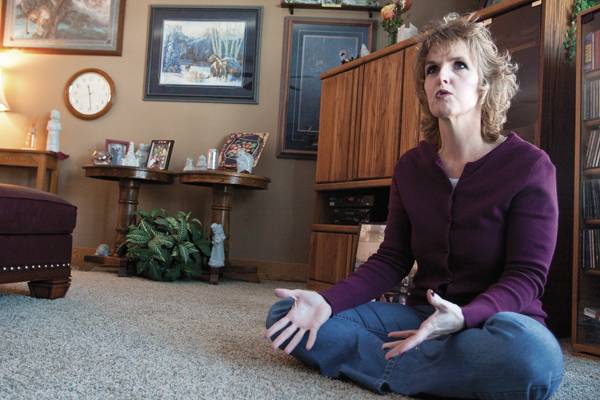Benevolent guidance

Ruth Phillips, foster mom of 65 adoptive mom of 7 and biological mom of 4, explains that her living room is the sacred room in her house and all of the children know not to leave their personal belongings in there. ‘I’ll throw them away,” she said with a laugh. Photo: Rashah McChesney
February 14, 2010
Note: This story is part one of a three-story series on Ruth Phillips and her journey to becoming a birth mom of four, adoptive mom of six and a foster mom of more than 65. The Phillips family resides in Story City, but Ruth works in the Ames area. Catch the next parts on Tuesday and Wednesday.
A 10-year-old girl stands on your front porch; her neck strains as she meets your eyes at a 90-degree angle. You are complete strangers. A Department of Human Service worker stands about a foot to the young girl’s right and introduces her as “the one we spoke about.” You smile as you kneel to meet the silent girl’s eye level. The DHS worker shakes your hand, dryly says, “Good luck” and leaves.
“I have a job for you. I need you to check my house to make sure it’s safe,” Ruth Phillips said to the child. “I want you to walk through every room, open every closet, every drawer, every dresser, everything. And then when you are all done checking, come back to me. I will stay here in the living room. I will not move. I need you to check the house.”
Ruth Phillips, Elevate program supervisor and foster, adoptive and birth parent, remembers this day as if it were yesterday. It was the day she had met one of her 65 foster children. Although this young girl wasn’t the first of the children she helped, Phillips can remember every first day with all of her foster children, especially the six she would eventually adopt.
Ruth is also a birth mother of four. Having children wasn’t the problem, but seeing how the foster care system was lacking in the late 1980s sparked her initial passion for helping and healing young adults. She says her big heart didn’t stop her when the National Organization for Victim Assistance training — the basic six-hour foster parent program in the 1980s — told her not to attach.
“She was incredible. She had dropped out of school. She was selling drugs on the street. She was pretty much a slippery slide to failure,” Phillips said. “DHS did what DHS did and dropped her at the door and said, ‘Good luck.’”
After being in Ruth’s home for six weeks, the teenage girl went from high school dropout to honor roll student.
The blossoming teen participated in student council and was looked at as a leader. Ruth said she was “hilarious, good humored, the whole bit and you just fell in love with her.”
After nearly 10 months with Phillips, the new and improved 13-year-old had only seen her birth parents twice, which only confirmed they were still using and dealing drugs. Yet the judge looked at her and said, “There are other kids that need foster care more than you; go home.”
Within three months of reuniting with her biological family, the teen had dropped out of school and was roaming the streets again.
“At that point, the rules were set up as we could not reconnect, so I couldn’t call her and tell her, ‘I’m here for you if you ever need me,’ because as a foster parent, when they come to your house, they are yours — kind of … when you let go of them, you were not to have contact with them anymore. It was like they were dead to you.”
Phillips was heartbroken.
“I was done. I was never going to do foster care again. I didn’t want to work with the system. I thought we had done everything right. We had this kid on the right path, and they sent her away.”
















